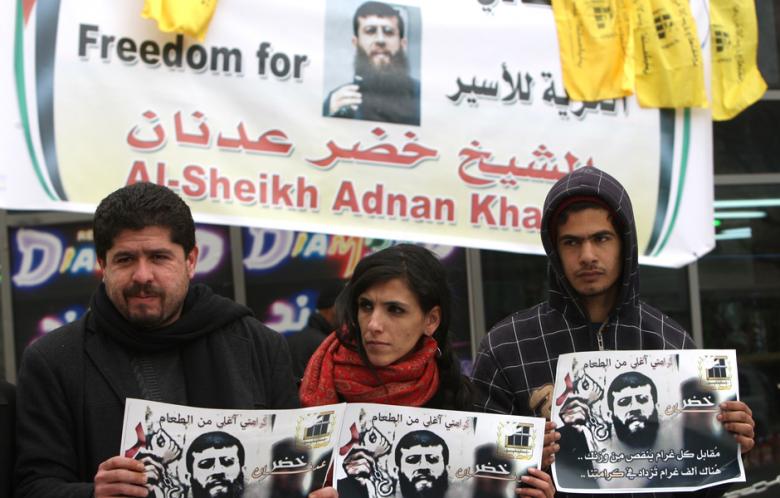
A Palestinian prisoner who has refused food for 60 days petitioned Israel's Supreme Court on Wednesday against his detention without charge, as thousands took to the streets in solidarity with him.
Lawyer Jawad Bulus said he had lodged an urgent appeal with the Supreme Court to lift the administrative detention order in light of the rapidly deteriorating health of his client, Khader Adnan.
Adnan, a 34-year-old baker from the northern town of Jenin, has been held by Israel without charge since 17 December under a procedure known as administrative detention.
He began refusing food a day after his arrest and is now said to be close to death.
"We filed an appeal this morning and requested an immediate hearing in front of the court due to the seriousness of his condition," Bulus told AFP. "We are awaiting an answer."
The petition was lodged two days after an Israeli military court rejected an earlier appeal by Adnan to have the four-month administrative detention order lifted.
Bulus, who visited Adnan on Tuesday at the hospital where he is being held in northern Israel, said his client was handcuffed to his bed in "inhumane conditions."
On Wednesday, Adnan's wife Randa visited him for the first time along with his father and the couple's two daughters, telling AFP she was "very worried" about her husband's chances of survival.
But although he appeared very weak, he was in good spirits and "will not end his hunger strike without advancing his cause," she said.
Following a recent examination of the prisoner, Physicians for Human Rights-Israel on Wednesday expressed grave concern about his well-being.
"Khader Adnan is immediate danger of death," the NGO warned in an English-language statement, adding that the danger would become a certainty within days.
"A fast in excess of 70 days does not permit survival," it said. "Infusion of liquids, adjustment of salts and the addition of glucose and vitamins cannot prevent certain death."
Meanwhile, thousands of Palestinians took to the streets of the West Bank and Gaza on Wednesday to show solidarity the prisoner, who is a political activist with the radical Islamic Jihad movement.
Close to 1,000 demonstrators, most of them young people, gathered outside Ofer prison near the West Bank city of Ramallah, sparking clashes with troops who fired tear gas and rubber bullets, an AFP correspondent and witnesses said.
In the southern city of Hebron, hundreds participated in a sit-in which was also attended by Palestinian prisoner affairs minister, Issa Qaraqa.
Demonstrators waved photos of the prisoners and placards on which was written: "No to arbitrary administrative detention."
"Khader Adnan has become a national symbol, an Arab symbol and an international symbol for his defence of the dignity of free men throughout the entire world," Qaraqa told AFP.
"The world must force Israel to restore the rights of Palestinian prisoners and treat them as prisoners of war and not as criminals," he said.
Similar rallies were held across the West Bank and Gaza, where demonstrators were observing a 10-hour solidarity fast which began at 8 am.
Last week, Adnan's lawyers appealed to an Israeli military court to lift the four-month administrative detention order, which is set to expire on 8 May, but the court on Monday threw out the appeal.
Adnan's two-month hunger strike is the longest period a Palestinian prisoner has ever gone without food, and officials have warned this his death could spark mass protests throughout the West Bank and the Gaza Strip.
He says Israel has no evidence against him, and accuses his interrogators of mistreating him, making crude sexual comments about his wife and pulling out his beard.
Israel has not made any public allegations against Adnan, a one-time spokesman for Islamic Jihad.
Human rights groups in Israel and overseas have appealed to Israel to free him or put him on trial.
Under Israeli law, a military tribunal can order an individual held without charge for up to six months at a time. Such orders can be extended by further six-month periods indefinitely, if approved in a new court session.




